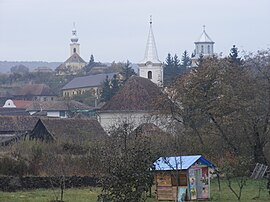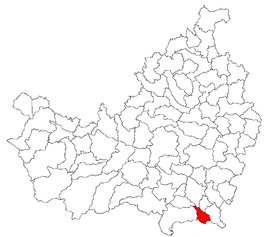Călărași (Romanian pronunciation: [kələˈraʃʲ] ; Hungarian: Harasztos; German: Wahldorf) is a commune in Cluj County, Transylvania, Romania. It is composed of three villages: Bogata (Bogátpuszta), Călărași, and Călărași Gară (Harasztosi vasútitelep).
Călărași
Harasztos | |
|---|---|
 Churches in Călărași village | |
 Location in Cluj County | |
| Coordinates: 46°29′05″N 23°51′20″E / 46.48472°N 23.85556°E | |
| Country | Romania |
| County | Cluj |
| Established | 1291 |
| Subdivisions | Bogata, Călărași, Călărași Gară |
| Government | |
| • Mayor (2020–2024) | Ioan Vasile Racolța[1] (PMP) |
Area | 37.9 km2 (14.6 sq mi) |
| Elevation | 367 m (1,204 ft) |
| Population (2021-12-01)[2] | 1,883 |
| • Density | 50/km2 (130/sq mi) |
| Time zone | EET/EEST (UTC+2/+3) |
| Postal code | 407130 |
| Area code | +(40) x64 |
| Vehicle reg. | CJ |
| Website | primariacalarasi-cluj |
Geography
editThe commune is situated at the western edge of the Transylvanian Plateau, at an altitude of 367 m (1,204 ft), on the banks of the river Grind. It is located in the southeastern corner of Cluj County, just south of the city of Turda, on the border with Alba County. The county seat, Cluj-Napoca, is 44 km (27 mi) to the northwest.
Transportation
editThe A3 motorway and national road DN1 (part of European route E81) merge at the northern edge of Bogata village. The Călărași-Turda train station in Călărași Gară serves the CFR Main Line 300, which connects Bucharest with the Hungarian border near Oradea.
Just east of Călărași Gară (in Luna commune) is the 71st Air Base "General Emanoil Ionescu" of the Romanian Air Force.
Demographics
edit| Year | Pop. | ±% |
|---|---|---|
| 1850 | 1,389 | — |
| 1941 | 2,043 | +47.1% |
| 1977 | 3,036 | +48.6% |
| 2002 | 2,587 | −14.8% |
| 2011 | 2,021 | −21.9% |
| 2021 | 1,883 | −6.8% |
| Source: Census data | ||
According to the 2011 census, the commune had 2,021 inhabitants; Romanians made up 64.4% of the population, Hungarians made up 32.6%, and Roma made up 0.4%.[3] At the 2021 census, Călărași had a population of 1,883; of those, 65.8% were Romanians and 23.53% Hungarians.[4]
References
edit- ^ "Results of the 2020 local elections". Central Electoral Bureau. Retrieved 11 June 2021.
- ^ "Populaţia rezidentă după grupa de vârstă, pe județe și municipii, orașe, comune, la 1 decembrie 2021" (XLS). National Institute of Statistics.
- ^ Tab8. Populaţia stabilă după etnie – judeţe, municipii, oraşe, comune, 2011 census results, Institutul Național de Statistică, accessed 17 February 2020.
- ^ "Populația rezidentă după grupa de vârstă, pe județe și municipii, orașe, comune, la 1 decembrie 2021" (in Romanian). INSSE. 31 May 2023.
-
Orthodox church in Bogata
-
Entrance sign to Călărași
-
Călărași-Turda train station
